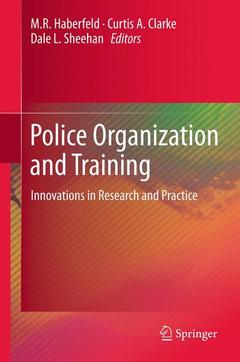Description
Police Organization and Training, 2012
Innovations in Research and Practice
Coordinators: Haberfeld M.R., Clarke Curtis A., Sheehan Dale L.
Language: English
Subjects for Police Organization and Training:
214 p. · 15.5x23.5 cm · Paperback
Publication date: 10-2011
214 p. · 15.5x23.5 cm · Paperback
Description
/li>Contents
/li>Biography
/li>Comment
/li>
Criminal enterprises are growing in sophistication. Terrorism is an ongoing security threat. The general public is more knowledgeable about legal matters. These developments, among others, necessitate new methods in police work--and in training new recruits and in-service officers. Given these challenges, improvements in training are a vital means of both staying ahead of lawbreakers and delivering the most effective services to the community.
Police Organization and Training surveys innovations in law enforcement training in its evolution from military-style models toward continuing professional development, improved investigation methods, and overall best practices. International dispatches by training practitioners, academics, and other experts from the US, the UK, Canada, Germany, Hong Kong, and elsewhere emphasize blended education methods, competency-building curricula, program and policy development, and leadership concepts. These emerging paradigms and technologies, coupled with a clear focus on ethical issues, provide a lucid picture of the future of police training in both educational and law enforcement contexts. In addition, the book's training templates are not only instructive but also adaptable to different locales. Featured in the coverage: Simulation technology as a training tool, the Investigation Skill Education Program and the Professionalizing Investigation Program, redesigning specialized advanced criminal investigation and training, a situation-oriented approach to addressing potentially dangerous situations, developments in United Nations peacekeeping training and combating modern piracy
Police Organization and Training is a key resource for researcher sand policymakers in comparative criminal justice, police and public administration, and police training academies. It also has considerable utility as a classroom text in courses on policing and police administration.
Includes a forward byRonald K Noble, Secretary General of INTERPOL.
Introduction.- Beyond Reproach: The Need for Effective and Responsive Training.-Changing Paradigms in Police Training: Transitioning from a Traditional to an Andragogical Model.- Innovative Law Enforcement Training: Blended Theory, Technology, and Research.- From Theory to Practice: Simulation Technology as a Training Tool in Law Enforcement.- Redesigning Specialized Advanced Criminal Investigation Training in Germany.-The Evolution of Police Training: The Investigative Skill Education Program.- The Professionalising Investigation Programme (PIP).-The Generational Gap: Values and Culture-building in the Hong Kong Police Force.-Learning to Deal with Potentially Dangerous Situations: a Situation Oriented Approach.- INTERPOL: An International Perspective on Police Training and Development.-Developments in United Nations Police Peacekeeping Training.-New Law Enforcement Challenges: Modern Piracy Faces Unprepared Local Law Enforcement.
1. Maria (Maki) Haberfeld is a Professor and Chair of the Department of Law, Police Science and Criminal Justice Administration at John Jay College of Criminal Justice in New York City. She was born in Poland and immigrated to Israel as a teenager. She served in the Israel Defense Forces in a counter-terrorist unit and left the army at the rank of a sergeant. Prior to coming to John Jay she served in the Israel National Police and left the force at the rank of lieutenant. She also worked as a special consultant for the U.S. Drug Enforcement Administration in the New York Field Office. She has conducted research in the areas of public and private law enforcement, integrity, and white-collar crime in the United States, Eastern and Western Europe and Israel. In addition to her research, she has also provided leadership training to a number of police agencies. Since 2001 she has been involved in developing, coordinating and teaching in a special educational program at John Jay for the New York City Police Department. Her recent publications include: Critical Issues in Police Training (2002, 2011), Contours of Police Integrity (co-editor, 2003), the International Volume of Sage’s Encyclopedia of Law Enforcement (volume editor, 2004), Police Leadership (2005), Enhancing Police Integrity (co-author, 2006), and Comparative Policing: The Struggle for Democratization (co-editor, 2007). Her latest works include three books on terrorism related issues: A New Understanding of Terrorism (co-editor, 2009), Modern Piracy and Maritime Terrorism (co-editor, 2009), Terrorism Within Comparative International Context (co-author, 2009), Russian Organized Corruption Networks and their International Trajectories (co-authored, 2011) and Police Organization and Training (co-edited) forthcoming September 2011.
2. Dr. Curtis Clarke received his Ph.D. from York University in 2000. Hisdoctoral disse




